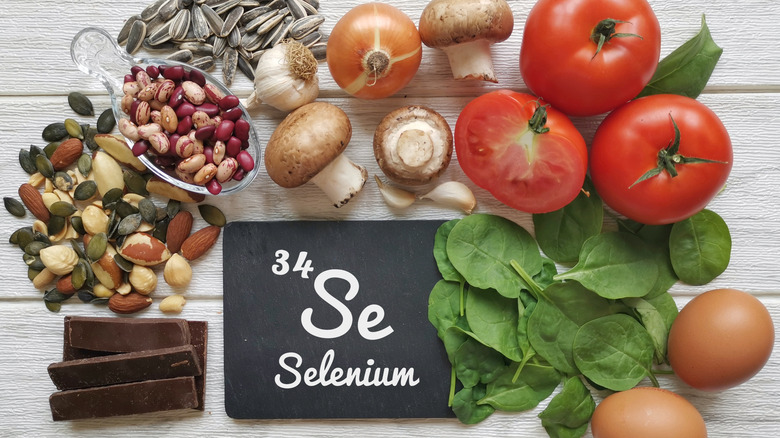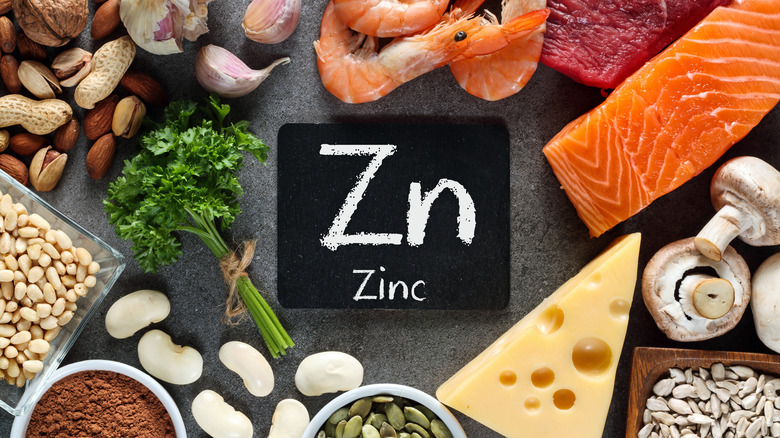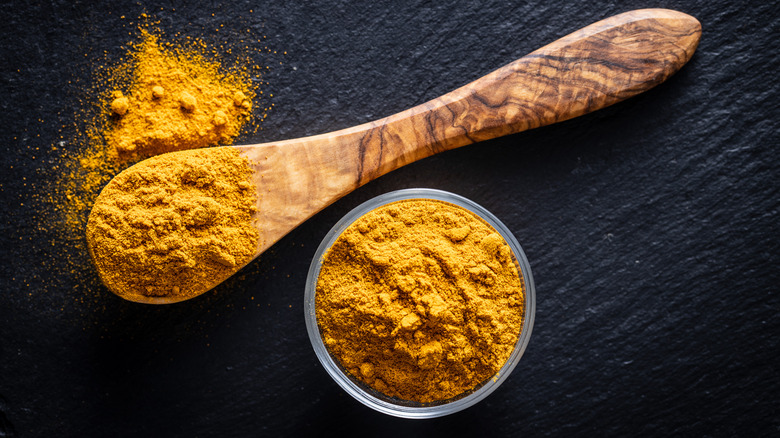Nutrients That Support Thyroid Health
Thyroid health might not be top on your list of priorities, but it's more important than most people realize. Since the thyroid impacts everything from metabolism to cholesterol to the muscles to the heart, taking care of our thyroid is actually super important (via WebMD).
If the thyroid isn't functioning well, it can produce too little or too much thyroid hormone, which can lead to hypothyroidism or hyperthyroidism. Symptoms of an unhealthy thyroid can include abnormal sweating, feeling fatigued or nervous, dry skin and brittle nails, depression, constipation, memory problems, rapid heartbeat, and more.
Thyroid disease affects approximately 20 million Americans, or 12% of the population (via American Thyroid Association). Women are 5-8 times more likely than men to develop a thyroid condition, although roughly 60% of people who have it are unaware.
Luckily, many thyroid issues can be managed through lifestyle changes, like diet (via MindBodyGreen). While there is a genetic factor to thyroid health, symptoms can usually be alleviated with simple diet changes, focusing on avoiding foods that are inflammatory to the immune system. The following nutrients can support you in your journey to optimal thyroid health, according to MindBodyGreen.
Selenium
Maybe you've never heard of selenium, but it's actually an important mineral for the production of thyroid hormones. It's what makes up selenoproteins, and if selenoproteins are low, the body has a hard time making thyroid hormones. Selenium is also an antioxidant, which is helpful for lowering inflammation and fighting free radicals. This is important for reducing oxidative stress, allowing your thyroid to function at its best.
Selenium can be found in many foods, but one of the best sources is Brazil nuts (via Healthline). Just 6-8 nuts, or 1 ounce, contain about 544 micrograms (mcg) of selenium, which is nearly 10 times the daily recommended amount. For those over 14 years of age, you only need about 55 mcg of selenium. It's important not to eat too many Brazil nuts too often to avoid selenium toxicity. Yellowfin tuna is another great source of selenium, along with ham, beef, turkey, cottage cheese, eggs, and enriched grain products like pasta and whole-grain cereals.
Zinc
Zinc is another super important mineral for thyroid health. As it's a trace mineral, we only need it in really small amounts — but those small amounts are crucial for a number of bodily functions, including making thyroid hormones. It's also important for building proteins, creating DNA, growing cells, and supporting a healthy immune system (via Healthline). The Recommended Dietary Allowance (RDA) for zinc is 11 milligrams (mg) per day for men and 8 mg for women. Meats, poultry, and seafood are major sources of zinc. Animal products are the best sources, as your body can easily absorb them, unlike plant sources, which contain other compounds that make absorption more difficult.
Research shows that zinc deficiency may actually be associated with low thyroid function, or hypothyroidism. A 2013 study published in the International Journal of Trichology found that supplementing with zinc improved hair loss and other symptoms of hypothyroidism. Researchers concluded that those with hypothyroidism should always be evaluated for zinc deficiency.
Iron
One of the biggest symptoms of thyroid conditions is fatigue, which is also present when iron levels are low (via Verywell Health). In fact, iron deficiency and thyroid disease often go hand-in-hand. Iron is necessary for thyroid function by helping to produce an enzyme called thyroid peroxidase, which is used to make thyroid hormones (via MindBodyGreen). Iron deficiency is often linked to hypothyroidism.
It's generally recommended that adult males get 8 mg per day (via the National Institutes of Health). However, women need a far greater amount, at 18 mg per day, and this number goes up for pregnant women. The best dietary sources of iron are lean meat, seafood, nuts, beans, vegetables, and fortified grain products. For example, fortified breakfast cereals contain about 18 mg of iron per serving, while canned white beans and cooked oysters provide about 8 mg. While some vegetables like spinach are good sources of iron, they contain inhibitors that make iron absorption difficult.
Omega-3
A key component of maintaining healthy thyroid function is reducing inflammation as much as possible. When inflammation becomes chronic and long-term, it can contribute to a multitude of conditions, like heart disease and cancer (via Healthline). Omega-3 fatty acids are well-documented in decreasing inflammation. They are shown to reduce the production of eicosanoids and cytokines, which are linked to inflammation. Studies have shown that when omega-3s are consumed in high amounts, inflammation is reduced.
Omega-3s can also help to improve gut health, which is closely linked to thyroid function (via MindBodyGreen). Some researchers consider them prebiotics, since they help to maintain healthy gut bacteria. There are many great sources of omega-3s, from both animal and plant sources. Try fish oil, wild-caught salmon, oysters, avocados, and chia seeds to incorporate more omega-3 into your diet. If none of these appeals to you, you can also take omega-3s as a supplement in capsule form.
Turmeric
Speaking of inflammation, turmeric is an age-old spice that has a wealth of antioxidant and anti-inflammatory properties (via Healthline). It's what gives curry its yellow color, a common ingredient in many Indian dishes. Not only is it used in traditional cooking in India, but it's also been used for thousands of years as a medicinal herb as well. Curcumin, the main active ingredient in turmeric, is increasingly being studied for its medicinal properties. It blocks the inflammatory response in the body by obstructing the production of pro-inflammatory genes, which is important for maintaining a healthy, functioning thyroid (via MindBodyGreen). It also increases the body's antioxidant ability to fight free radicals.
Try combining it with honey and hot water or milk to make turmeric tea or a latte, add it to scrambled eggs, use it to season roast vegetables, add it to rice, or toss some roasted nuts in it (via MindBodyGreen).






